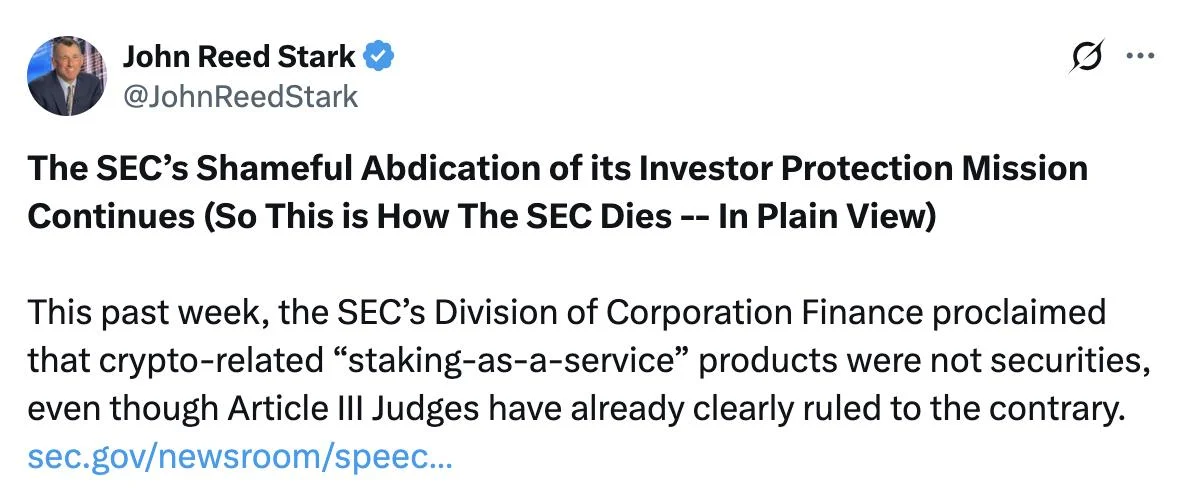
Here’s what happened in crypto today
Today in crypto, the US SEC is under criticism after issuing new guidance on crypto staking. In Singapore, the central bank has set a deadline for local crypto firms targeting overseas markets to halt operations. Meanwhile, in South Korea, the crypto community eyes the election results. SEC faces criticism over crypto staking shiftThe US Securities and Exchange Commission (SEC) is facing mounting criticism from current and former officials over its evolving stance on crypto staking services. On May 29, the SEC’s Division of Corporation Finance issued new guidance on crypto staking services, claiming that certain offerings may not constitute securities and effectively exempting proof-of-stake blockchains from registration requirements under the Securities Act.However, the SEC's fresh interpretation may diverge from several federal court rulings, according to former SEC chief of Internet Enforcement, John Reed Stark.In a statement on X, Stark argued the Commission’s latest move contradicts judicial findings in high-profile cases against crypto exchanges Binance and Coinbase, where judges previously allowed allegations that staking products qualified as securities under long-standing legal precedent.“This is how the SEC dies – in plain view,” Stark wrote in a lengthy response to the agency, calling the shift “a shameful abdication of its investor protection mission.” Sitting Commissioner Caroline Crenshaw also issued a statement on May 29 in response to the agency’s approach to crypto staking, warning that the staff’s conclusions did not align with established case law or the Howey test.Singapore orders local crypto firms to cease overseas activity by June 30Singapore’s central bank has set a deadline of June 30 for local crypto service providers to stop offering digital token (DT) services to overseas markets.The directive came from the Monetary Authority of Singapore’s (MAS) response to industry feedback on its proposed regulatory framework for Digital Token Service Providers (DSTPs) under its Financial Services and Markets Act of 2022 (FSM Act). MAS stated that no transitional arrangements will be made for local DTSPs providing services abroad. It said that any Singapore-incorporated company, individual or partnership that provides DT services outside Singapore must either cease operations or obtain a license when the DTSP provisions come into force by the end of June. “DTSPs which are subject to a licensing requirement under section 137 of the FSM Act must suspend or cease carrying on a business of providing DT services outside Singapore by 30 June 2025,” MAS wrote. Under Section 137 of the FSM Act, Singapore-based businesses are presumed to be operating from Singapore and are thus subject to licensing. This includes companies whose overseas token-related activities are not their primary business activity. Companies found violating the laws will be subject to hefty fines of up to 250,000 Singaporean dollars ($200,000) and imprisonment of up to three years. South Korea crypto industry wins no matter election outcomeSouth Korea’s crypto scene will gain either way in the country’s presidential elections slated for June 3, as both major candidates have run on pro-crypto platforms, pledged to ease regulations and expand crypto access.South Koreans will elect a new president in a snap election to replace Yoon Suk-yeol, who was impeached and removed from office over his attempt to impose martial law in December.The two major parties contesting the election are the center-left Democratic Party and the staunchly conservative People Power Party. Polls show Democratic Party nominee Lee Jae-myung is ahead, with 49% favouring Lee, while 36% said they prefer People Power Party nominee Kim Moon-soo.Lee wants to allow South Korea’s $884 billion national pension fund to invest in crypto and has called for a won-backed stablecoin, while Kim has pledged to ease regulations and expand crypto adoption. Both have backed legalizing spot crypto exchange-traded funds.South Korea has one of the world’s most active crypto markets, and daily trading volumes on crypto exchanges sometimes exceed the country’s major stock indexes, with user numbers recently surpassing 16 million.